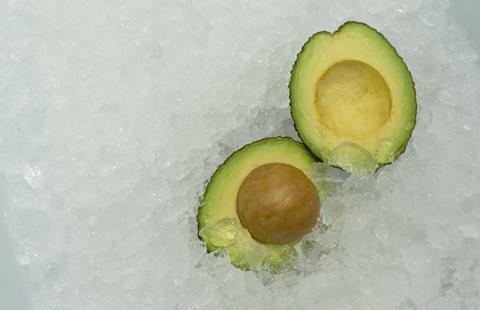Rising divorce rates and smaller households have brought new opportunities for fresh suppliers looking to diversify into frozen as first container of frozen Peruvian avocados arrives in China

Changing consumption habits due to rising divorce rates and smaller households are opening new opportunities for frozen produce suppliers.
Peruvian exporters are among those looking to capitalise on new household patterns, particularly in China, where smaller families have less time to cook.
PromPeru’s trade commissioner to China, Bernado Muñoz, said divorce rates in Shanghai in particular are rising, having exceeded 60 per cent, so families are smaller and “that’s why frozen is an alternative”.
Speaking at Asiafruit’s Showcase Stage, in the new Frozen Fruit and Vegetable Forum at this year’s Asia Fruit Logistica conference programme, Muñoz said: “Marriages have halved since 2015, there is less marriage, more divorce, more time alone and more frozen produce. This is the big trend.”
The first container of frozen avocados is set to arrive from Peru into China this month, added Muñoz, taking advantage of shorter transit times thanks to the new port at Chancay.
“We are preparing ourselves to speed up on frozen fruit exports. We have seen fast growth in Europe. I do see the same thing happening in Asia,” he told delegates.
Steady but consistent growth in global frozen market
The first Frozen Fruit and Vegetable Forum was chaired by FPJ editor, Fred Searle, who gave a market overview of key trends in the sector.
China, India and Japan are among global markets seeing a surge in demand for frozen fruit thanks to urbanisation and advances in freezing technology, he explained.
“Rising trends include purees for fruit smoothies and ingredients for food manufacturing, particularly in Vietnam which has invested heavily in Individual Quick Freezing (IQF) to meet demand in the US, China and India,” said Searle.
“Egypt and Morocco are world leaders in frozen berries, which are largely absent in Asian markets, while Peru’s exports of frozen avocados to Asia are growing,” he added.
Fabian Garcia, export sales director at major US avocado supplier Calavo, said the company sees the benefit of frozen to help ease availability and ensure price stability.
“There is no waste with frozen avocado as we can pack to exact specs,” he said, confirming that the company sees potential for its frozen guacamole and other added value products in markets across Asia.
Desserts bring potential for frozen tropical suppliers
Turning to the opportunity in other tropical categories, Dr Tan Sue Yee, CEO of premium durian supplier Top Fruits Malaysia, said there is potential for frozen durian to transform the global tropical fruit industry.
Durian is known for being “stinky and high value”, he said, but noted that it also has a “very high nutritional content”.
Key exporters of frozen durian include Thailand, the Philippines, Vietnam and Malaysia, with Indonesia and Cambodia as emerging players. China is the top importer with a growing demand in the Middle East, as well as the US and Canada.
“In China, durian is a premium gift so a lot of attention is given to packaging,” said Tan, adding that re-sealable packs and desserts are also a growing opportunity. “In China, the value added products are booming thanks to live streaming,” he said.
Durian ice cream is a particularly successful way of attracting new shoppers, according to Tan, who said there is growth in western markets as people begin to try it.
“We’re seeing big growth in demand in Europe and the US. We do see Caucasian people starting to eat more durian and willing to try it,” he said.
Topics
- Asia
- Asia Fruit Logistica
- Asiafruit Congress
- Asiafruit Knowledge Centre
- Avocados
- Berries
- China
- Consumers
- Convenience
- Europe
- Events
- Exotic fruit
- Foodservice
- Fruit
- Hong Kong
- Japan
- Logistics & Cold chain
- Malaysia
- Marketing
- Markets
- North America
- Peru
- Philippines
- Production & Trade
- Products
- Retail
- South America
- Supply
- Topics
- United States
- Vegetables
- Wholesale



